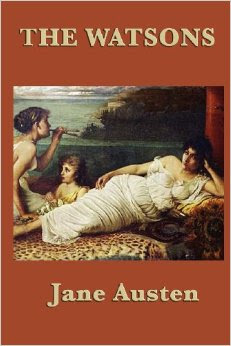After tackling the monstrously long Don Quixote and the depressing Lord of the Flies, our book club turned to a very short, light read, The Watsons by Jane Austen. It is an unfinished work she wrote in the middle of her career. It is unclear why she didn't finish it. It starts out delightfully with rich characters, but alas.
In my copy the story runs only 45 pages long, just enough time to figure out who everyone is and become interested in what happens to them. And then it just ends, with no hint of a resolution. I mean it IS Jane Austen, so we know it ends with a marriage predicated on love, with a good income thrown in for the practically minded, but how do we get there? For that, there are only hints.
The story begins with 19-year-old Emma Watson returning to her family home after being raised by an Aunt for the last 14 years. She is a stranger to her dad, three sisters, and two brothers. Being driven to a ball by her older sister, Elizabeth, we catch up on the family gossip. Elizabeth seems content with her station in life of a romance gone awry and taking care of her father. The other two sisters are busy finding a man to marry. One brother is married to money, the other seeks a girl above his station as well, but with little headway. Emma has been raised in a wealthy home, but the death of her uncle and the remarriage of her aunt to a man who wants nothing to do with the ward puts Emma in an odd situation. She has no money or property of her own, yet she has been raised to be upper class. Her only hope is to marry money. Will it be the playboy, Tom Musgrave? or the pretentious and awkward Lord Osborne? or sweet clergyman Mr. Howard? Good money is on Mr. Howard, but we'll never know.
The story ends with Emma rejecting an offer to come stay with her brother, Robert, and his snobbish wife. Musgrave has finished playing with Elizabeth and younger sister Margaret. He's moved on to Emma, who sees right through him. Lord Osborne is making some halting inquiries. As far as we know, Mr. Howard has forgotten all about the sweet girl who rescued his 10-year-old nephew from embarrassment and heartbreak by asking the boy to dance at the ball.
Although Austen has been criticized for focusing exclusively on money-chasing women who live dull lives punctuated by parties and cards, I think she paints a deeper picture of womanhood. These women live in world where they have few choices. Born and raised in the middle and upper classes, they cannot simply get a job or open a business. Their futures will be determined by whom they marry. Their career is the service of their husband's chosen profession. In a sense, choosing a man to marry is similar to choosing a college or a career. The ramifications on the lifestyle of the woman are deeply impacted by the quality of the man she marries.
I don't fault these women for trying to make the best of a hard situation. With few options for self-support, they must try hard to balance out the necessary features of a successful marriage with a potential career. A man may be a wonderful potential partner, but without a means of supporting a family, love is not enough. Conversely a potential partner may be well off, but totally unsuited as a husband and father. The list is long and the competition fierce. The unknowns, daunting.
Emma faces the choice of the wife of a modest clergyman and the life that entails, the wife of a handsome and rich player who will definitely keep her wondering as to his fidelity, or the wife of a Lord, serving as the Lady of the estate and the myriad responsibilities that presents. Of course she could always remain a spinster, caring for an aging father, laughed at and pitied by society. But a successful career as a business owner, doctor, politician, or landowner is not one of her options. She briefly entertains the idea of being a teacher, but recoils at that hateful occupation!
Emma's world is completely foreign to us. Women today have so many choices. Of course there are those who assail women for making the "wrong" choice. [See: Audi Superbowl 2017 ad] Today, a woman can have whatever career she wants or marry and stay home with her kids. In some respects the "have-it-all" crowd have hurt women by making them think they actually can and SHOULD do it all. I love that we women have choices, but like ALL choices, if you choose A, you often cannot have B. That feels somehow unfair. It's not, it's reality. But reflecting on the life presented by Emma we can see that she too had limited choices and if she chose one, she could not have the other. These women were tough, practical, and determined. I applaud them for their indefatigable spirit and desire to make their way in the world with the resources they had. We can learn a lesson. Emma and her ilk did not complain, they made choices, and lived with them. We have it so much better in some ways, but as is often the case, too many choices can make it that much harder to choose.

No comments:
Post a Comment